I attended the LIHNN Christmas study last December, which was the first face-to-face LIHNN study day that’s taken place since COVID. It was so nice to be back seeing fellow library colleagues in person! It was refreshing to interact with the network again, share ideas and have informal chats about our work. The day started with an ‘unboxing’ of the agenda by Susan Smith who came to us via video link. This was an entertaining start to the day and got everyone excited for the day’s events.
The first session of the day was about the LIHNN Award Finalists, and they all gave a presentation about their work:
1. Manchester Cancer Research Publication Project – Daniel Livesey
This was presented by Daniel Livesey, Library and Knowledge Services Manager at The Christie Hospital. He explained that the Christie maintains an institutional repository for affiliated research. They start by searching for research affiliated to the Christie, the data is then ‘cleaned’ and uploaded to the repository, and they report this data to the Research and Innovation department. However, the accuracy of the data has always been contentious so they were asked to form a project group to look at how they could improve data. The project aimed to ensure consistency in gathering and analysing publications; to promote the impact of publications and improvements to research; provide evidence to back up claims in external communications; and to provide recognition and celebration of research at The Christie. The project group had members from the University of Manchester, Cancer Research UK Manchester Institute, Manchester Cancer Research Centre, and The Christie. The data gathered will be used to connect researchers together; monitor trends in publications; internal/external reporting; and communication of high impact publications. The main reason behind the project is summed up here: “Curating data and converting it into information that is useful is very challenging – especially if it is to be robust enough to influence decision making and strategic planning. The analysis by the team resulted in a fantastic resource, and more of this kind of work will be essential to maximise Manchester’s potential to drive cancer discoveries and impact patient care” (Professor Stephen Taylor).
2. Library in a box project – Stephanie Burns, Southport and Ormskirk Hospital NHS Trust
Stephanie started by explaining she was new to the NHS, and was impressed by what we can offer, but felt we needed to sing louder! The Library-in-a-Box project began as a way to deliver a ‘taster’ of the library services to those Trust staff who were unable to visit the Library in person due to time commitments. It was also a way of promoting what they do to a wider audience. The project started with a 1 year trial where 2 departments received a box every 2 months on a total of 6 different themes: Wellbeing; Coaching + Mentoring; The Money Box; Communication Skills; Healthy Eating; Teamworking. Each box contained: a selection of relevant books; informative journal articles; membership forms; handouts; posters; and bookmarks. In addition, each box contains a selection of ‘goodies’ e.g. face creams, biscuits, etc. These proved to be very popular! The boxes were promoted on the local trust news page; library social media accounts; displays; and by word of mouth. As a result of the project they learnt that everyone loves a freebie! Also that many Trust staff didn’t know the range of material held in the Library, and some Trust staff thought the Library was just for student use. Although there are some financial risks to projects like this, e.g. books going missing, staff time required to prepare the boxes, etc., they felt it was worth it for increased visibility among Trust staff, relationships built in new areas, and increased library membership.
3. Reflective practice workshops – Bethan Morgan, Manchester University NHS Foundation Trust
Bethan identified a need for reflective practice training at her Trust because it’s an important part of nurse revalidation and CPD, but they were not offered any training as part of their course. The Library thought they could fill this gap. Reflection can be a good way of looking back on challenging events at work, but it’s also good for the well-being of staff, as well as for their career development. The workshops were aimed at all professions at the Trust, not just nurses, because reflection is useful to everyone. They wanted the workshops to be practical and useful to staff, not just because reflective practice is a formal requirement. As a result of the workshops, they expanded their training output, and built a stronger relationship with the nursing education team which would be useful for future projects. They faced some challenges though, such as audience participation, low feedback, and keeping the momentum going after the initial interest. In future they plan to grow attendance through promotional activities and word of mouth, and tailor content to specific audiences.
Minutes of Mayhem!
After a short break, it was then time for the Minutes of Mayhem! The following had 3 minutes to talk about something they have worked on:
- Recording and sharing Quality Improvement work (Mid Cheshire Hospitals NHS FT, Tracy Dixon)
- Creating profiles of our users in paramedic medicine (LKS Ambulance Service, Matt Holland)
- Working with Health and Wellbeing (St Helens & Knowsley Teaching Hospitals NHS Trust, Yvonne Stubbington)
- Creating two library training videos (Wirral University Teaching Hospital FT, Jacqueline Pearce)
- Offsite Library Service (Keyll Darree, Isle of Man, Stacey Astill)
- Search Club (HEE KM Team, Katie Nicholas)
4. The impact of AI, machine learning, automation and robotics on the information professions - Andrew Cox, University of Sheffield.
After a delicious lunch, and some fun with the Christmas quiz, we had some more speakers for the afternoon session. The first was Andrew Cox, a senior lecturer from the Information School at the University of Sheffield. He has written a research report for CILIP called “The impact of AI, machine learning, automation and robotics on the information professions” and he spoke to us about his findings. Can we trust machines? There are lots of reasons to be excited about the use of AI in libraries - it’s built on data so our information skills become highly relevant. Examples of AI in libraries include: administrative tasks, knowledge discovery, automation of systematic reviews, chatbots to answer queries, data literacy training, and analysing user behaviour. There are many drivers for using AI in libraries, such as improved access to knowledge, potential gains in equity, improved services, and cost savings. However, there are also barriers, such as ethical/legal issues, data issues, skills/image of profession, over promising, and implementation challenges. His report answers the following questions: 1) How do we ensure the workforce has the skills required to support users?, 2) What are the ethical implications to using these technologies?, 3) What will the future workforce look like and what curriculum will ensure the next generation has the technological skills required. His “research has highlighted a set of skills and competencies that information professionals will need to develop in order to support their users and organisations through this 4th Industrial Revolution” (CILIP). This was a very interesting and thought provoking talk from Dr Andrew Cox.
Read Andrew’s report in full here: https://www.cilip.org.uk/page/researchreport.
5. Can poetry help combat misinformation? - James Ryan and Geoff Walton
The final speakers of the day were James Ryan and Geoff Walton who spoke to us about using poetry as a means of combatting health misinformation. Their project looked at how health information expressed in poetry might help express health information in a better way. Information literacy is good for your well-being, and poetry is good for your well-being, and they have a common base – the written word. So to what extent can these subject areas be brought together to solve the hard problem of health misinformation? Results from a workshop indicated that “there may be inherent qualities in poetry which can successfully convey health information and enhance information literacy more successfully than current forms”. Health information could be re-purposed in poetic form, using the emotional aspects of storytelling embodied in poetry as a mechanism for successfully conveying of health information, as opposed to the dry and sober standard text. Poetry can represent marginalised groups with local voices, regional dialects, and lived experiences, and can be more relatable than standard health information.
The slides for the above presentations and minutes of mayhem can be found here: https://www.lksnorth.nhs.uk/events/lihnn-christmas-study-day-2022/
Awards
The day ended with David Stewart awarding the LIHNN award winners with their prizes. The Gold Award went to Dan Livesey from The Christie, the Silver Award went to Bethan Morgan from Manchester University, and the Bronze Award went to Stephanie Burns from Southport and Ormskirk NHS Trust. The Minutes of Mayhem winner was Liam Kay from Wirral University Teaching Hospitals NHS Trust who talked about training videos they had created. And finally, there were also awards for Cheryl Dagnal, who won the David Stewart Award, and for Ramona Naicker for her services to the Network.
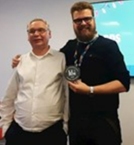
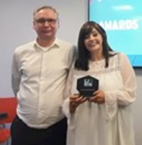
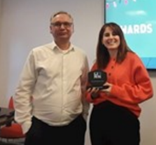
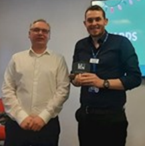
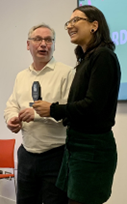
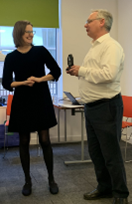
Amy Belch
Assistant Electronic Resources Officer
Lancashire Teaching Hospitals NHS Foundation Trust

